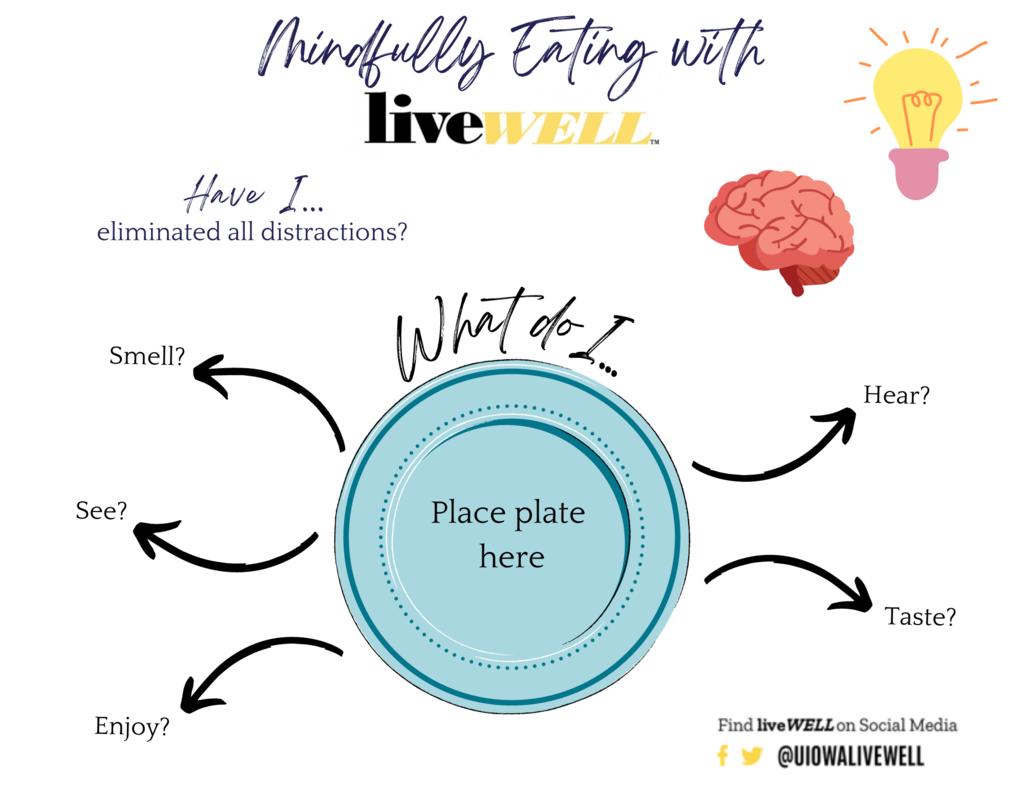What is mindful eating?
Mindful eating is an approach to eating that uses all the senses to experience and enjoy the food you eat. The goal of mindful eating is to tune into your body's signals of hunger and fullness without judgment. This can help you become more aware of how your environment, thoughts, and emotions affect your eating patterns.¹
Research has shown that mindful eating can lead to an improved overall well-being, increased pleasure when eating, and body satisfaction. Mindful eating can address all these elements by promoting better digestion, keeping you full of less food, and influencing wiser food choices. ²
Mindful eating can help you identify different cues – both from your body and environment – about when it’s time to eat. Busy work schedules and life pressures often prevent us from bringing our full attention to meals, leading to mealtimes that are driven by external factors (such as time and convenience) rather than internal factors (such as hunger and satiety cues).
By creating more awareness with mindfulness, you can take steps towards positive behavior change and a healthier relationship with food.
The science behind mindful eating
There are different hormones in your body that send a signal to your brain when you’re hungry and when you’re full:
- Leptin suppresses appetite and signals to the brain that your body has sufficient energy stores.
- Ghrelin is released in the stomach and signals to your brain that energy stores are low, and it is time to eat.4
Recognizing these signs can lead to a decrease in mindless consumption or eating to the feeling of discomfort. Next time you sit down for a meal, stop yourself and ask, “Do I feel satisfied?” If the answer is yes, consider taking a break from the meal or stopping altogether. If you still feel hungry, honor your body, and continue enjoying the food on your plate.
Overcoming barriers to mindful eating
Prior Preparation and Planning. Planning ahead can do wonders for that busy work day or those activity-filled family days. To ensure that you don’t unintentionally skip a meal or overconsume later in the day, planning just one snack or meal can make a difference. Here are some quick and nutritious ideas that hardly take any prep time at all and are perfect for when you’re on the go:
- Apples with peanut butter + string cheese
- Rotisserie chicken breast + salad greens + your favorite dressing
- Mixed berries + yogurt
- Peanut butter toast + bananas + honey
The 3-3-2 rule. When grocery shopping, use the 3-3-2 rule to guide your purchases and meal planning for the week. Purchase 3 veggies, 3 fruits, and 2 protein sources as a start. Then mix and match these food groups to your heart’s content to create staple meals.
Tips to incorporate mindful eating into daily living
Eat intentionally. Think about your reason for eating. Is it driven by emotion? Hunger? Boredom? Pay attention to what you are eating and why you are eating it.
Appreciate the time, energy, and resources that went into the meal. Take a moment prior to your meal to consider the effort that went into bringing the food to your table. Show appreciation for your food by expressing what you are grateful for and acknowledging the friends and family you may be sharing your meal with.
Eat slowly and chew your food. Chewing your food slowly and thoroughly allows your brain the opportunity to recognize when it is full. By practicing this tip, you can increase mealtime satisfaction and improve digestion.
Turn off distractions. Distractions can contribute to mindless eating and prevent you from fully focusing on your eating experience. Research has shown that “mindless” or distracted eating leads to overeating, anxiety and weight gain.² Some examples of mindless eating include eating while driving, while working, while sitting in front of the TV or scrolling through social media. To enhance your eating experience, try eliminating unnecessary distractions in the food environment.
Finish eating when you feel satisfied. Eating to satisfaction may or may not result in a “cleaned” plate, and that is OK! Everybody has different hunger/fullness cues, and as a mindful eater, it’s important that you can recognize what those cues look like for you. The proposed tips in this article (in addition to practice) will help you to develop skills for enhancing awareness related to hunger and fullness.
Be present with the food. Engage all your senses while eating and pay attention to textures, flavors, aromas, etc. Utilizing these strategies will help to increase your attentiveness to the food on your plate.
Aim to eat 3 meals per day. Skipping meals may lead to increased hunger, thus grabbing for the easiest and quickest food choices within reach. Practice listening to your body when it is hungry and honoring that signal when you receive it. If you are struggling to interpret your hunger cues, try asking yourself how you would physically and emotionally feel if you were to eat at any given moment.
Put it into practice. To practice actively incorporating some of these new concepts into your mealtimes, try utilizing the “Eating Mindfully with liveWELL” activity at your next meal. This exercise is designed to guide your eating and enhance your awareness of the food in front of you. With this activity, you will be asked to consider and document the sensations of your food while you consume it.

Campus resources
liveWELL has resources available to assist with your mindful eating journey, including health coaching, liveWELL trainings, and lifestyle change programs. Consider utilizing these resources for additional support. Contact liveWELL at 319-353-2973 or livewell@uiowa.edu.
References
- Mindful eating. The Nutrition Source. February 2, 2023. Accessed May 23, 2023. https://www.hsph.harvard.edu/nutritionsource/mindful-eating/.
- Stanszus LS, Frank P, Geiger SM. Healthy eating and sustainable nutrition through mindfulness? Mixed method results of a controlled intervention study. Appetite. 2019;141:104325. doi:10.1016/j.appet.2019.104325
- Fung TT, Long MW, Hung P, Cheung LWY. An expanded model for mindful eating for health promotion and sustainability: Issues and challenges for Dietetics Practice. Journal of the Academy of Nutrition and Dietetics.
- Magee, E. (n.d.). Your “hunger hormones.” WebMD. https://www.webmd.com/diet/features/your-hunger-hormones
